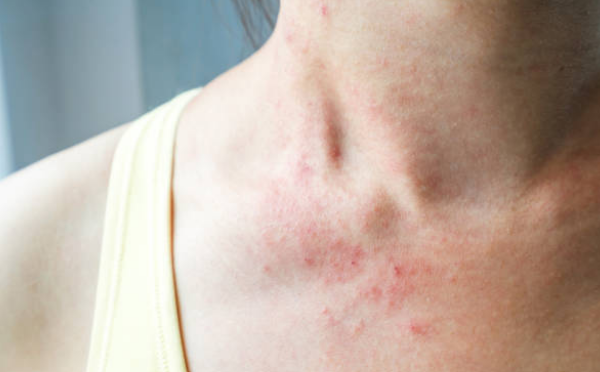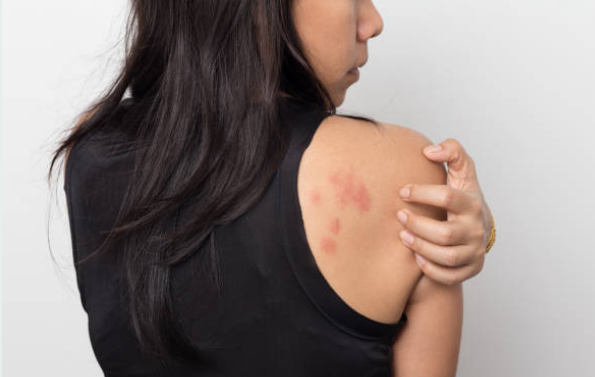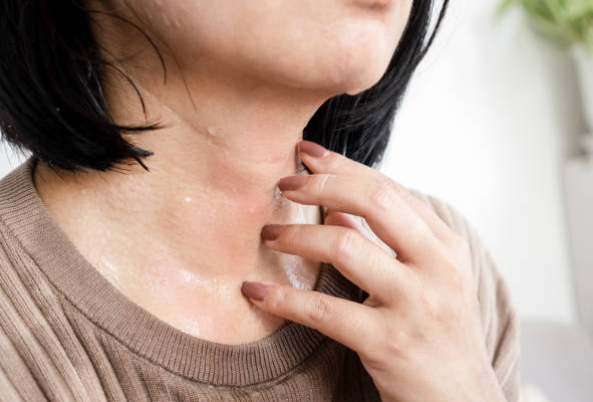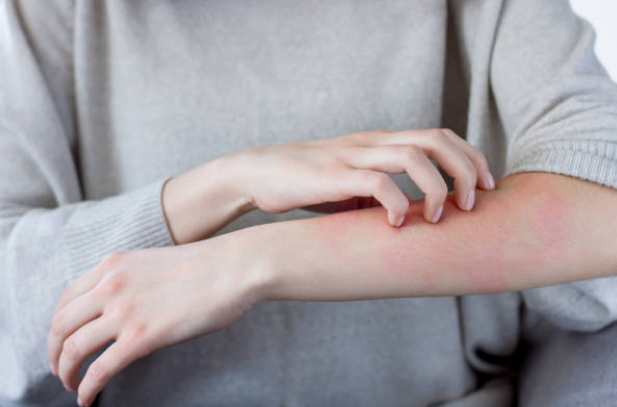Can Stress Cause a Rash?
Surveys indicate that Americans are among the most stressed globally. Despite being an emotional experience, stress can profoundly affect our physical well-being. Alongside elevated blood pressure, headaches, and fatigue, skin rashes emerge as frequent symptoms of stress and anxiety.
People with existing skin conditions are more prone to stress-related rashes. Increased emotional stress can worsen these underlying skin problems, resulting in stress rashes. It’s essential to effectively manage stress levels and pre-existing skin conditions to prevent and ease dermatological reactions.
What Does Stress Rash Look Like?
When stress causes rashes, they usually appear as raised red bumps or hives. They can show up on different body parts, but the face, neck, chest, and arms are common areas. The hives come in various sizes, from tiny dots to large welts, and may cluster together, causing itching or a burning and tingling sensation.
Hives typically manifest as raised, swollen, and itchy plaques anywhere on the body, appearing intermittently. They may emerge in one area, subside, and reappear elsewhere. Usually, hives resolve within 2 to 3 hours, providing relief within a day. Itchiness is a familiar sensation in affected areas, accompanied by tingling or a burning feeling upon contact.
While an individual hive tends to fade in approximately 24 hours, new ones may surface as old ones vanish. If hives persist and recur for about six weeks, it is categorized as “acute hives.” Symptoms may extend beyond six weeks in less common instances, indicating chronic hives.
Stress Rash Photos
What Causes Stress Rash?
Stress rashes often affect people with skin conditions like eczema or allergies, such as those caused by pollen or certain foods. Some may even get rashes from sunlight or weather changes. Still, stress alone can lead to a rash without a pre-existing condition.
Here are the common causes of stress-induced rashes:
Major Life Events:
- Starting college.
- Getting married.
- Other significant life changes.
Occupational Factors:
- New jobs or challenging promotions.
Lifestyle Changes:
- Adopting an overly ambitious exercise routine.
- Quitting smoking.
- Drastic changes to diet.
Emotional Distress:
- Death in the family or sources of grief.
- Anxiety over friends or loved ones facing difficulties.
Sleep Issues:
- Periods of insomnia or poor sleep hygiene.
Underlying Mental Health Conditions:
- History of anxiety.
- Depression.
- Bipolar disorder.
- Somatoform disorder or other mental health conditions.
Chemical Response to Stress:
- Release of extra chemicals such as neuropeptides and neurotransmitters during stress or anxiety.
Immune System Response:
- Stress-induced increase in immune cells, potentially leading to autoimmune reactions and hives.
These factors, either individually or in combination, can contribute to the development of stress rashes.
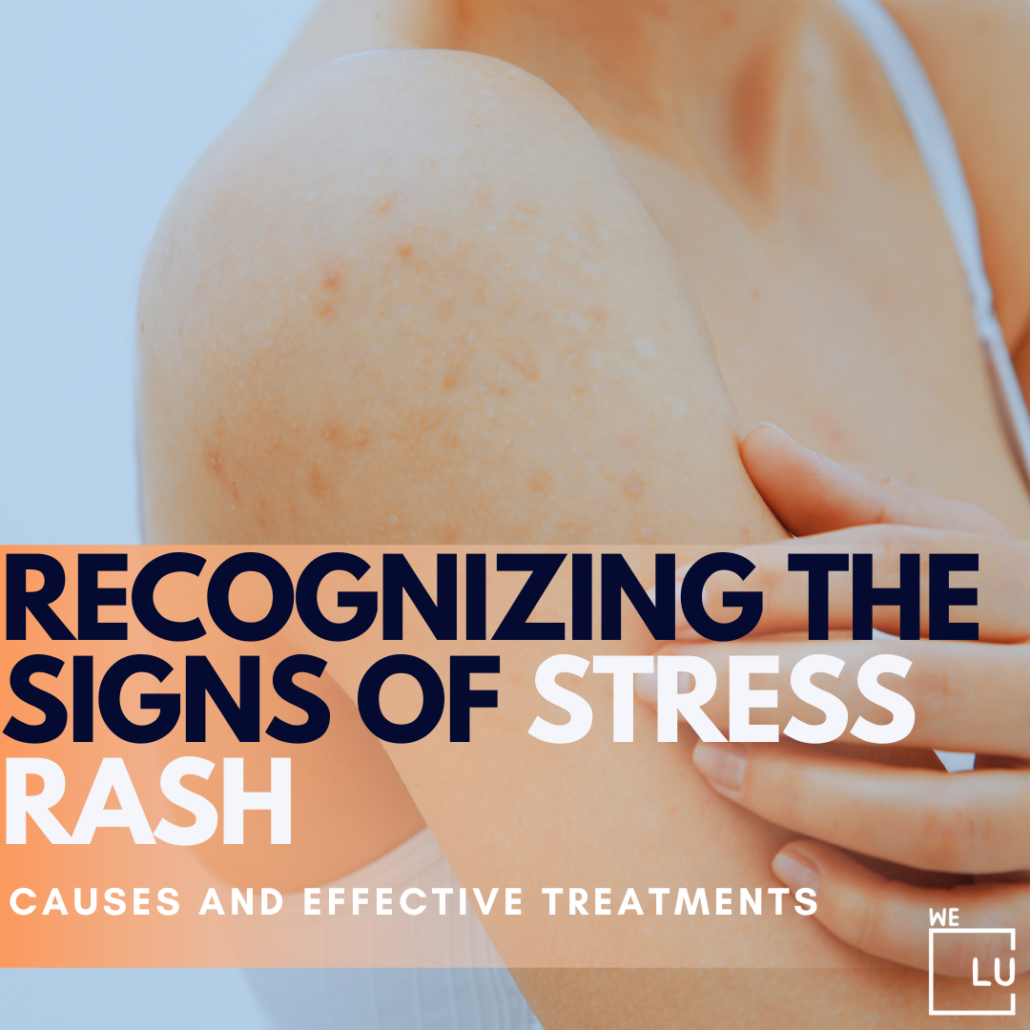
Skip To:
Learn More:
Get stress counseling that works. Discover professional help from We Level Up Florida’s mental health therapists. Start getting support with a free call to our mental health hotline.
Get Help. Get Better. Get Your Life Back.
Searching for Accredited Dual Diagnosis Mental Health Centers Near You?
Even if therapy failed previously, or are in the middle of a difficult crisis, we stand ready to support you. Our trusted behavioral health specialists will not give up on you. When you feel ready or just want someone to speak to about counseling alternatives to change your life call us. Even if we cannot assist you, we will lead you to wherever you can get support. There is no obligation. Call our hotline today.
FREE 24/7 Dual Diagnosis Mental Health Services HotlineStress Rash Treatment
While stress rashes are generally not severe, if you experience breathing difficulties or swelling in the throat or lips, it’s crucial to call 911 immediately. These symptoms could indicate a potentially life-threatening issue requiring emergency care.
Most stress-induced rashes typically resolve on their own within a few days, although there is a possibility of recurrence, with some persisting for up to six weeks. Refraining from scratching the rash is crucial, as this can exacerbate the condition and potentially spread bacteria through minor skin abrasions.
Ease swelling and itching with home treatments like cool compresses (avoid applying ice directly to the skin). Over-the-counter antihistamines like Benadryl or Zyrtec can help, but be cautious of drowsiness—check labels or ask your pharmacist.
If your rash persists after a week or worsens, contact your doctor. Some cases can also be diagnosed through a video visit, and your provider may prescribe a more potent antihistamine or cortisone cream to reduce inflammation and aid healing.
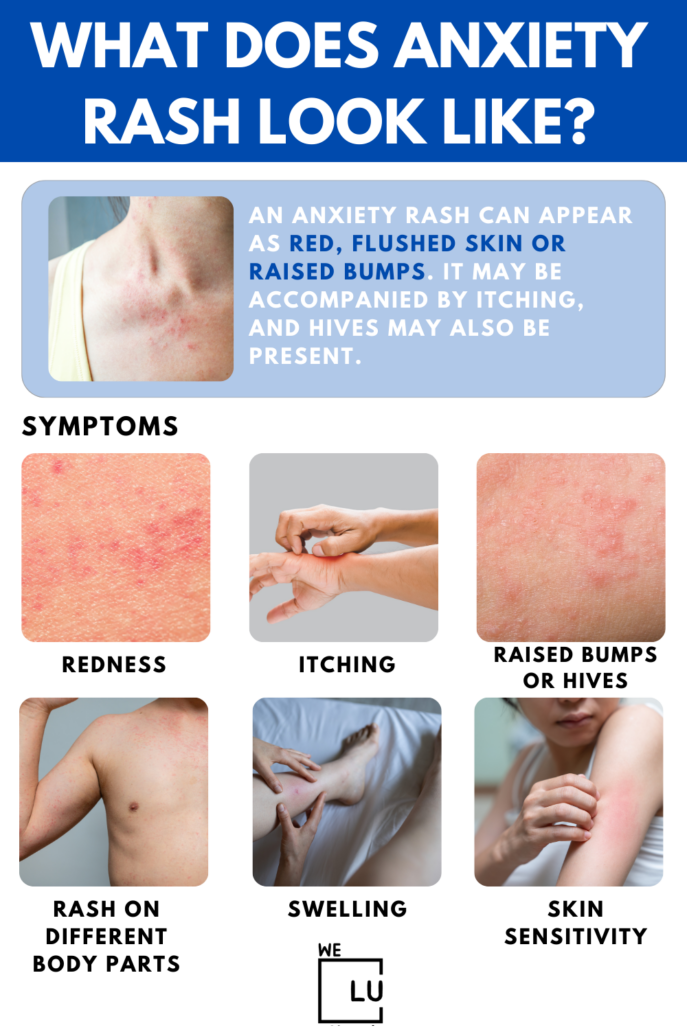
Most Common Medical Treatments for a Stress Rash
Hives often disappear without medicines, but if not, you can usually treat them at home. The go-to remedy is an over-the-counter antihistamine, which helps relieve itching and other symptoms.
Antihistamines:
- Benadryl.
- Zyrtec.
Topical Treatments:
- Cortisone cream (consult with a healthcare professional before use).
Cool Compresses/Ice Packs:
- Apply to affected areas to relieve swelling and itching (avoid direct skin contact with ice).
Always check product labels for usage instructions and potential side effects, and consult a healthcare professional for personalized advice.
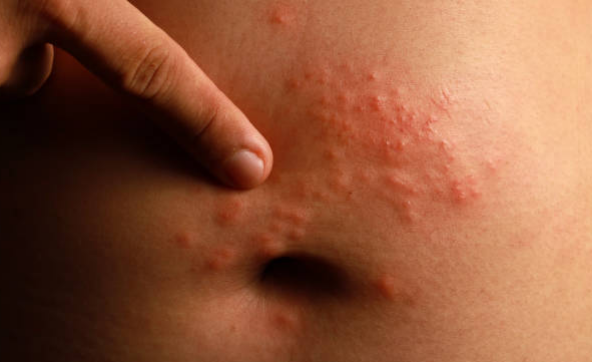
Natural Home Remedies for Stress Rashes
Explore various natural home remedies for a stress rash without needing store-bought products. You can soothe your rash by:
- Apply a cool compress to the affected areas.
- Take a lukewarm shower or a calming oatmeal and milk bath.
- Use lotions that are fragrance- and dye-free.
- Staying hydrated and reducing alcohol and caffeine intake.
- Creating an herbal poultice to reduce skin inflammation.
- Avoiding hot showers or high humidity.
- Steering clear of tight clothing or anything that may rub against your skin.
While stress rashes often resolve on their own, individuals with underlying stress and mental health conditions may experience persistent and worsening symptoms. The presence of these underlying factors can contribute to a prolonged and more severe manifestation of stress-related skin reactions. In such cases, seeking guidance from a healthcare professional is advisable to address the immediate skin concerns, underlying stress, and mental health conditions for comprehensive and effective management.
Managing Your Stress
To avoid stress rashes, actively manage stress by engaging in activities like exercise and meditation, maintaining a consistent sleep routine, and practicing healthy coping mechanisms. A well-balanced lifestyle, including a nutritious diet and staying hydrated, strengthens the body against stress, reducing the likelihood of developing stress-related skin reactions.
We Level Up FL Mental Health Center Tips To Cope With Anxiety Stressed Stress Rash
✅ Try relaxing activities like deep breathing, meditation, or yoga to alleviate stress and lower the chances of getting stress rashes.
✅ Keep a healthy routine with regular exercise, enough sleep, and a balanced diet to promote overall well-being and lessen the effect of stress on the skin.
✅ Avoid stress rash triggers like tight clothes, harsh skincare, and allergens. Opt for gentle, fragrance-free skincare to reduce skin irritation.
✅ Drink plenty of water for healthy skin and seek emotional support from friends, family, or professionals—sharing your feelings is crucial for managing anxiety and stress.

End the Emotional Pain. Get Your Life Back.
Feeling Depressed, Anxious or Struggling with Mental Health Illness? Get Safe Comfortable Mental Health Dual Diagnosis High-Quality Therapy From Counselors That Care. Begin Your Recovery Now.
Hotline (855) 940-6125How To Prevent Stress Rashes?
Effectively managing stress is vital to preventing physical signs of mental stress. When people actively deal with stress and engage in activities like exercise or meditation, they create a defense against the negative impact stress can have on the body. These activities regulate the body’s stress response, promoting calmness, reducing stress hormones, and enhancing overall emotional well-being.
- Practice Stress-Reducing Techniques: Engage in activities like deep breathing, meditation, or yoga to alleviate stress.
- Maintain a Balanced Lifestyle: Incorporate regular exercise, ensure sufficient sleep, and follow a nutritious diet.
- Identify and Avoid Triggers: Steer clear of potential stress rash triggers such as tight clothing, harsh skincare products, and allergens.
- Use Gentle Skincare Products: Choose fragrance-free and gentle skincare items to minimize skin irritation.
- Stay Hydrated: Keep the body hydrated to support overall skin health.
- Seek Emotional Support: Don’t hesitate to contact friends, family, or professionals for emotional support—it’s crucial for stress management and rash prevention.
Taking a holistic approach to stress management can significantly decrease the chances of physical issues like tension, headaches, digestive problems, and skin conditions linked to mental health stress.
What is Eczema Stress Rash?
Eczema stress rash refers to worsening eczema symptoms due to heightened stress levels. Stress can trigger or worsen eczema flare-ups, increasing itching, redness, and inflammation. Managing stress is crucial in minimizing the impact of eczema stress rash.
Treatment for eczema stress rash involves stress management techniques and skincare measures.
- Individuals can practice stress-reducing activities like deep breathing, meditation, or yoga to alleviate symptoms.
- Maintaining a consistent skincare routine using fragrance-free and gentle products can also help soothe the skin.
- Applying moisturizers regularly and avoiding harsh soaps can contribute to skin hydration.
A healthcare professional may recommend topical corticosteroids or other prescription medications to address inflammation in severe cases. Individuals with eczema stress rash need to consult with a healthcare provider for personalized advice and a tailored treatment plan based on the severity of their symptoms.
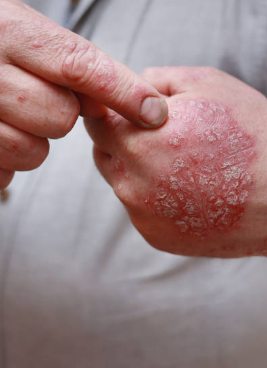
Treating Stress Rash on Arm
To treat arm rashes, keep the area clean and dry, use a mild soap, and avoid hot water. Moisturize regularly with a gentle lotion and, if itchy, try over-the-counter hydrocortisone cream. Resist scratching, wear breathable clothes, and find and remove potential triggers.
To treat a stress rash on wrist:
- Start by ensuring the area is clean and dry.
- Use a mild, fragrance-free soap when washing, and avoid hot water to prevent irritation.
- Regularly apply a gentle moisturizer to keep the skin hydrated. If itching is a concern, consider using over-the-counter hydrocortisone cream following the product’s instructions.
- Resist the urge to scratch to prevent further irritation, and choose loose-fitting clothing to reduce friction on the affected area.
- Identify and eliminate potential triggers, such as specific fabrics or skincare products.
To treat a stress rash inner elbow:
- Keep the area clean and dry using a mild, fragrance-free soap.
- Avoid hot water to prevent irritation, apply moisturizer regularly, and consider using over-the-counter hydrocortisone cream if there’s itching—follow the instructions.
- Avoid scratching, wear loose-fitting clothes, and identify and remove potential triggers like specific fabrics.
If the rash persists or worsens, consult a healthcare professional for personalized advice and treatment.
Treating Stress Rash on Chest
To treat a stress rash on the chest, keep it clean and dry, use a mild, fragrance-free soap, and avoid hot water. Apply a gentle moisturizer regularly to keep the skin hydrated. If it itches, try over-the-counter hydrocortisone cream as directed. Resist scratching, wear loose, breathable clothes, and identify and eliminate potential triggers like specific fabrics. If the rash worsens, consult a healthcare professional for personalized advice and possible prescription medications.
Treating Stress Rash on Legs
To treat a stress rash on the legs, the first step is maintaining cleanliness and ensuring the affected area is dry. Use a mild, fragrance-free soap while washing, and steer clear of hot water to prevent additional irritation. Regularly apply a gentle moisturizer to keep the skin hydrated, and consider using over-the-counter hydrocortisone cream if itching is a concern—adhering to the product instructions. Resist the urge to scratch to prevent further aggravation, and opt for loose-fitting, breathable clothing to reduce friction on the affected legs. Identifying and eliminating potential triggers, such as certain fabrics or skincare products, can also aid healing.
If the stress rash on the legs persists or worsens, seeking advice from a healthcare professional is recommended. They can provide a proper diagnosis and offer a tailored treatment plan, which may include prescription medications or additional interventions depending on the severity of the symptoms.
First-class Facilities & Amenities
World-class High-Quality Mental Health Services & Behavioral Health Substance Abuse Treatment
Rehab Centers TourRenowned Mental Health Centers. Serene Private Facilities. Inpatient Rehab Programs Vary.
Mental Health Helpline (855) 940-6125Proven recovery success experience, backed by a Team w/ History of:
15+
Years of Unified Experience
100s
5-Star Reviews Across Our Centers
10K
Recovery Successes
- Comprehensive Dual-Diagnosis Treatment
- Complimentary Family & Alumni Programs
- Coaching, Recovery & Development Events
- Comfortable Onsite Medical Detox Center
Final Thoughts on Stress Rashes
Stress poses a significant threat in our daily lives, but effective management, antihistamines, doctor consultations, and identifying triggers can help eliminate stress-related skin issues. If you’re dealing with frequent stress rashes or skin flare-ups due to stress and anxiety, consider contacting We Level Up mental health treatment center for advice. Our experienced mental health professionals can address symptoms of stress with evidence-based programs and therapies.
If you or someone you know is struggling with stress rashes and stress symptoms, We Level Up Florida’s mental health treatment center specializes in comprehensive care. Our team of experienced professionals is dedicated to personalized stress treatment plans. Take the first step towards healing and embark on a journey towards improving your health. Contact us today to get started. Each call is free and confidential.
World-class, Accredited, 5-Star Reviewed, Effective Mental Health Dual Diagnosis Programs. Complete Integrated Inpatient Rehab with Free Post Discharge Therapy Planning.
CALL (855) 940-6125End the Emotional Pain Rollercoaster. Gain Stability & Happiness Through Recovery Treatment. Start Mental Health Counseling Today. Get Free No-obligation Guidance by Behaviroal Health Specialists Who Understand Mental Health Recovery.
8 Steps and Tips for Maintaining Your Mental Wellbeing
Experience Transformative Recovery at the We Level Up Treatment Center.
See our authentic success stories. Get inspired. Get the help you deserve.



Start a New Life
Begin with a free call to a behavioral health treatment advisor. Learn more about our dual-diagnosis programs. The We Level Up treatment center network delivers recovery programs that vary by each treatment facility. Call to learn more.
- Personalized Care
- Caring Accountable Staff
- World-class Amenities
- Licensed & Accredited
- Renowned w/ 5-Star Reviews
We’ll Call You
Search We Level Up FL Stress Rash Treatment, Mental Health Topics & Resources
Sources
- Can you get a rash from stress? Chen Y, Lyga J. Brain-skin connection: stress, inflammation, and aging. Inflamm Allergy Drug Targets. 2014;13(3):177-90. Doi: 10.2174/1871528113666140522104422. PMID: 24853682; PMCID: PMC4082169.
- Bin Saif GA, Alotaibi HM, Alzolibani AA, Almodihesh NA, Albraidi HF, Alotaibi NM, Yosipovitch G. Association of psychological stress with skin symptoms among medical students. Saudi Med J. 2018 Jan;39(1):59-66. Doi: 10.15537/smj.2018.1.21231. PMID: 29332110; PMCID: PMC5885122.
- Graubard R, Perez-Sanchez A, Katta R. Stress and Skin: An Overview of Mind Body Therapies as a Treatment Strategy in Dermatology. Dermatol Pract Concept. 2021 Sep 1;11(4):e2021091. Doi: 10.5826/dpc.1104a91. PMID: 34631261; PMCID: PMC8480446.
- Stress and your health – Medical Encyclopedia – MedlinePlus (.gov)
- The Stress Response and How it Can Affect You – Veterans Affairs (.gov)
- Manage Stress – MyHealthfinder – Office of Disease Prevention and Health Promotion (.gov)
- Worthen M, Cash E. Stress Management. [Updated 2023 Aug 14]. In: StatPearls [Internet]. Treasure Island (FL): StatPearls Publishing; 2023 Jan-. Available from: https://www.ncbi.nlm.nih.gov/books/NBK513300/
- Salleh MR. Life events, stress, and illness. Malays J Med Sci. 2008 Oct;15(4):9-18. PMID: 22589633; PMCID: PMC3341916.
- Organizational and Individual Stress Management – Substance Abuse and Mental Health Services Administration (SAMHSA)
- Stress and Your Health – Florida Department of Health (.gov)
